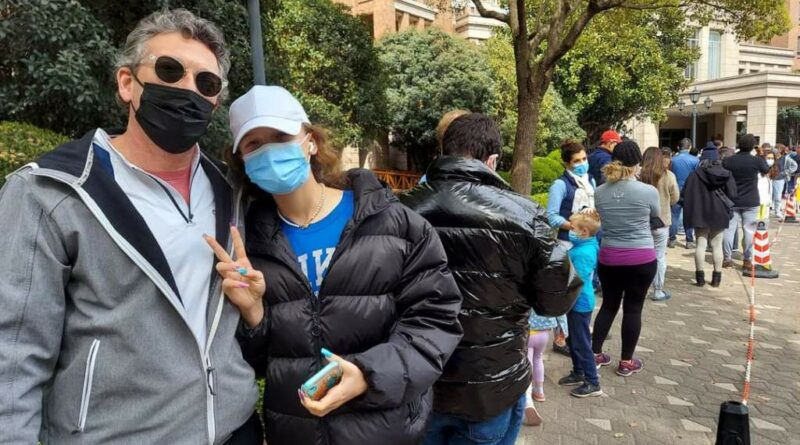Colorado family trapped in Shanghai’s “zero COVID” lockdown
Marysue Hauser spent her 17th birthday last week stuck in her family’s Shanghai apartment, eating a birthday cake her mom made by bartering for ingredients with neighbors.
Some of people in the complex sang to Marysue from their balconies, others joining in with cellos, flutes and pianos. Though she loved the gesture, Marysue said she missed her freedom.
“Shanghai’s such a nice city, so usually for my birthday, me and my friends will go downtown and do fun stuff and go out to eat,” Marysue said.
But this year Marysue couldn’t. She and her Colorado family are among the millions of Shanghai residents who’ve been subjected to one of China’s most severe lockdowns under its “zero-COVID” strategy. The family has been unable to leave their gated compound for nearly three weeks.
Late this week, Shanghai began easing rules that confined most of its 25 million people to their homes after complaints they had trouble getting food. But most of its businesses still are closed.
The Chinese government reported 29,411 new COVID-19 cases Thursday, all but 3,020 with no symptoms. Shanghai accounted for 95% of that total. A health official warned this week that Shanghai didn’t have the virus under control despite its easing restrictions.
Some 6.6 million people were allowed to leave their homes in areas that had no new cases for at least a week. But at least 15 million others still are barred from going outdoors.
The Hausers lived for years in the Denver area before moving to Chad for five years and on to Shanghai for the last four years. Marissa and Chad Hauser, teachers at an international school in Shanghai, wanted the opportunity to travel with their two children, Marysue and Will, 14.
“I think that my kids have probably been to 25 countries,” Marissa Hauser said.
At the start of the pandemic, the Hausers were on a Chinese New Year vacation in Vietnam, so the family traveled back to the United States rather than home to Shanghai. After eight months in the U.S., the family was able to return to their home in Shanghai and had experienced a relative normal daily routine since September 2020.
The teachers and their children were able to attend school in-person and go out downtown. While they have to wear masks, Marissa Hauser said the city was doing a lot better with COVID-19 than much of the United States.
“Shanghai is an awesome city full of lots and lots of neat things to do: museums, restaurants and bars,” Marissa Hauser said. “A lot of times our weekends are out doing things in the city.”
But last month, the school where the Hausers teach and where the children attend moved online as COVID-19 cases rose, and the family could see that a lockdown was coming.
By then, the family already had dealt with many cancellations of track meets for Marysue — and coached by Chad — as well as volleyball games for Will. With the cancellation of another track meet so last-minute that it involved turning the school bus around, the stress of more pandemic-related restrictions and possible separation from their children should anyone need to be quarantined led the Hausers to decide to move back to the Denver area this June.
“On that bus ride is when my wife looked at me and said, ‘Well, this is it. This is the end,’ ” Chad Hauser said.
When Will talked about heading back to the U.S. early as school moved online, his parents decided it would be smart for the 14-year-old to attend in-person classes. Just nine days before the family went into strict lockdown, Will traveled with a family friend to his grandparents’ house in Centennial, where he’s going to school and staying until his family gets home.
Under the current lockdown, the Hausers are able to move throughout their apartment compound, but not leave the area, which is surrounded by a fence and security guards. The residents are tested for COVID-19 daily, and any positive tests — there have been none so far — would require the whole compound to quarantine for 14 days.
The biggest problem facing the Hausers during the lockdown has been the difficulty in getting groceries. With no way to get out, the residents have begun pooling orders for large rations of food that are delivered every few days. Coordinating the orders takes time and attention, so the Hausers make sure to stay in communication with neighbors over WeChat, a messaging app.
“I joke that I spend half my day on grocery WeChats,” Marissa Hauser said.
The family misses the adventures they used to go on, with Chad Hauser regretting that they won’t be able to explore more of China before they leave.
“I’ll have lived here for four years and never been to the Great Wall,” Chad Hauser said.
The family’s biggest source of frustration is the uncertainty in knowing when the lockdown will finally end, Chad Hauser said — and whether it will prevent them from being able to leave for the U.S. in June as they’ve planned.
“I worry that we will have difficulty getting out of the country,” Marissa Hauser said.
The Associated Press contributed to this story.
Source: Read Full Article



